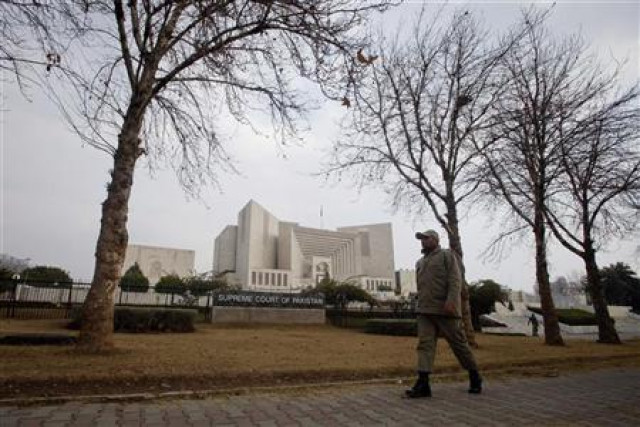Stalled process: Govt wins one-week reprieve for NAB chief
SC warns govt of ‘consequences’ if it fails to make the appointment.

“If the government wants to shut down NAB, it should say so in a single line reply,” says Chief Justice. PHOTO: REUTERS/FILE
Expressing serious reservations over the government’s failure to appoint a new National Accountability Bureau (NAB) chairman, the Supreme Court on Friday warned the federation it would have to face the music if a bureau chief is not selected soon, as the government again sought a week’s time for the appointment.
These observations were made by a three-judge bench headed by Chief Justice Iftikhar Muhammad Chaudhry, comprising Justice Azmat Saeed and Justice Jawwad S Khawaja.
“There are mega corruption scandals pending in the NAB, but there is no head of this key institution for the last three months,” observed the chief justice.
“If the government wants to shut down NAB, it should say so in a single line reply,” he said, adding a number of people would have been in prison if the government was clear in its policies regarding curbing corruption.

Justice Sheikh Azmat Saeed said it seems that ending corruption is not on the agenda of the government. “Does the government want NAB to die its own death?”
The apex court ruled that NAB was formed to uproot corruption, however, even after passage of three months and ten days, its chairman has not been appointed and investigations into a number of mega-corruption scandals were pending.
Earlier, a five-member bench of the Supreme Court in its verdict had asked the government to appoint a new NAB chairman without wasting time. The government, however, never implemented the court’s directives.
Attorney General Munir A Malik, during the proceedings of the case, informed the bench that the government and the opposition were working on the appointment of a NAB chairman and a meeting between the prime minister and the opposition leader was held on September 6 in this regard.
Stating reasons for the delay the AG remarked, “It is crucial to include the opinion of the opposition leader in appointing a person with consensus, but since he is out of the country the issue is pending.”
However, the chief justice dismissed these excuses stating that the court’s job was to implement the rule of law.

“This is not our issue. Our issue is the rule of law and the implementation of the judgment of the court,” the chief justice said, adding that just because the opposition leader was out of the country did not mean that the whole administration should be paralysed.
“Tomorrow, if the prime minister is out of the country, does that mean the entire administration should stop functioning?” he asked.
The chief justice again stated that a major institution of the country was defunct due to the absence of its chief, despite major corruption scandals.
Meanwhile Justice Jawwad S Khawaja said that the absence of bureau head did not affect the rich, but the poor.
“It does not affect rich people like you and me, but the poor people, whose rights are snatched because of such decisions,” he stated.
However, the attorney general pleaded for a one-week extension and assured the court that a NAB chairman will be appointed soon.
“Give me one more week as the government is following all the best standards to appoint a suitable person on this key slot to avoid criticism,” Malik said.
Meanwhile, the chief justice also criticised the government on making the Federal Service Tribunal dysfunctional due to lack of legislation.
The attorney general argued that the federal government needed majority in both houses of the parliament for legislation, which it did not have. To which the chief justice said, “The government can bring an ordinance for the time being to make the institution operational and later pass it in parliament.”
Published in The Express Tribune, September 14th, 2013.



















COMMENTS
Comments are moderated and generally will be posted if they are on-topic and not abusive.
For more information, please see our Comments FAQ